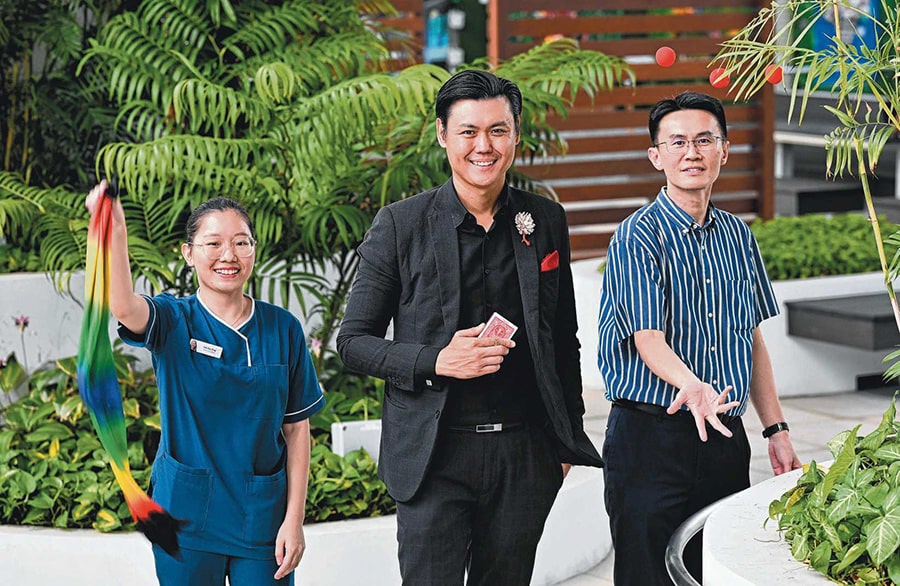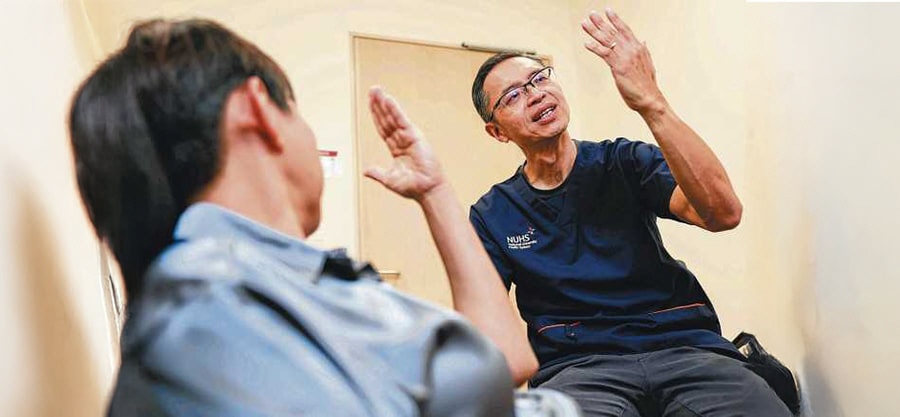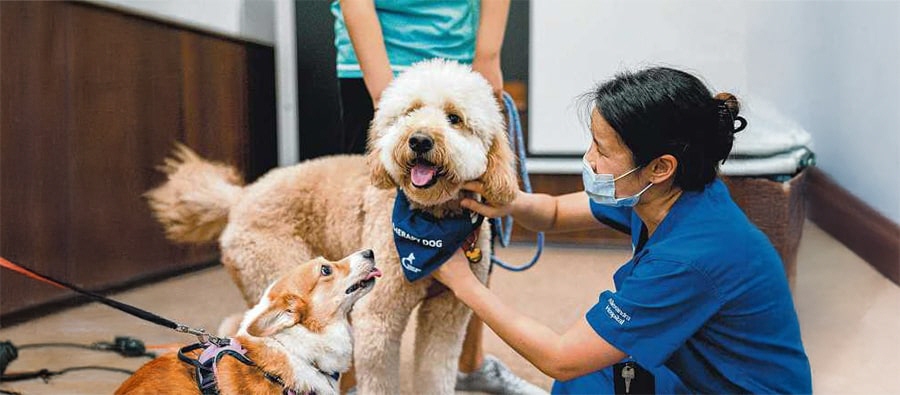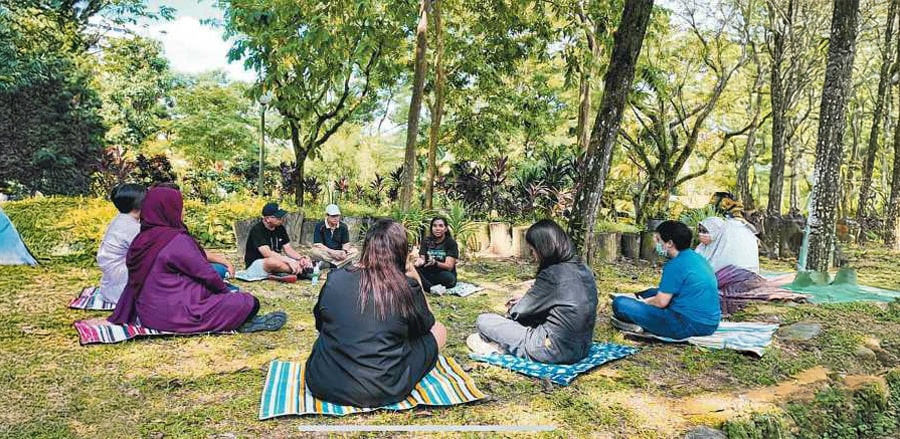 Tan Tock Seng Hospital’s senior staff nurse Toh Kai Ting (left) and senior psychologist Peter Tan (right) are among healthcare professionals who have picked up magic skills – aimed at helping patients overcome the monotony and repetitiveness of standard physiotherapy exercises – through sessions with magician Alexander Yuen. Some of the healthcare staff also pass on the tricks to the patients. ST PHOTO: LIM YAOHUI
Tan Tock Seng Hospital’s senior staff nurse Toh Kai Ting (left) and senior psychologist Peter Tan (right) are among healthcare professionals who have picked up magic skills – aimed at helping patients overcome the monotony and repetitiveness of standard physiotherapy exercises – through sessions with magician Alexander Yuen. Some of the healthcare staff also pass on the tricks to the patients. ST PHOTO: LIM YAOHUI
The Sunday Times (10 November 2024)
Health professionals pick up magic tricks to engage and build rapport with patients
Senior psychologist Peter Tan has a bag of tricks to help and delight his patients at Tan Tock Seng Hospital (TTSH).
One of his magic tricks involves shaking a black scarf until – mere seconds later – rainbow hues appear on the cloth. The 48-year-old does magic for some of his patients who suffer from mental health challenges, stroke and mild dementia. Philanthropic house Lien Foundation has introduced magic as a new tool for healthcare professionals to employ in their patient care journey.
It engaged Mr Alexander Yuen, managing director of Singapore magic production company Meta Illusions, to teach healthcare professionals in participating hospitals tricks that can help their patients overcome the monotony and repetitiveness of standard physiotherapy exercises. Some of them also pass on the tricks to the patients.
Mr Yuen conducted a pilot workshop of five sessions in August 2023 at Khoo Teck Puat Hospital (KTPH). A second workshop for TTSH commenced in December the same year.
He teaches about eight different tricks, each serving a unique function. "One way I structure the class is to pair up easy tricks with more challenging ones," he told The Sunday Times.
With this approach, when the healthcare professionals go on to teach patients the same tricks, the patients get a confidence boost after succeeding with an easy trick, and are encouraged to tackle the more difficult ones with greater resilience, he said.
Lien Foundation chief executive Lee Poh Wah said: "Hospitals can be lonely, intimidating places, and patients often feel stressed and helpless. We believe that magic can help clinicians establish quick rapport with patients, making them feel more at ease."
He added: "Learning a magic trick, however simple, gives patients a sense of control and achievement. The shared experience of wonder and laughter can enhance patient satisfaction and recovery, in ways conventional methods fall short."
Madam Annie Tan, 87, a former nursing officer with dementia who was admitted into TTSH for behaviour management, said she liked the flowers used in the tricks as they were pretty. She also performed the tricks for other patients. Her daughter, Madam Monica Lee, a 61-year-old former educator, said: "My mum enjoyed the magic activity, and it rebuilt her confidence. It made her happy to bring joy to the other patients."
Besides TTSH and KTPH, Lien Foundation is discussing with KK Women’s and Children’s Hospital about introducing magic to complement the work clinicians do with sick and scared children. New magic tricks will be designed for this different patient group and the clinicians will be trained and supported, said Mr Lee.
Mr Tan said incorporating five to 10 minutes of magic into his hourlong psychotherapy sessions helps him build quick rapport with his patients, and encourages them to open up to him about their struggles and emotions.
"By using magic to make something that seems unchangeable or impossible to change, and then suddenly making it change or disappear from my hands, I show them that anything is possible and that we don’t always have to continue to see things or our situations in the same negative way," he said. "There is always hope and other alternative ways to see or solve our problems."
Senior staff nurse Toh Kai Ting, 26, is among the 26 TTSH staff who went through about five sessions of magic lessons with Mr Yuen, as part of the hospital’s Namaste Care Plus programme for dementia patients. She realised some of her patients have started showing increased attention, as the magic activity helps in the cognitive training of those suffering from dementia.
"I feel a sense of joy and accomplishment when I can engage a patient who is withdrawn or having behavioural issues. Magic activity is a good icebreaker to catch our patient’s attention and allows me to build trust with them," she said. Hypnosis can also help with treatment on top of medication, said Dr Daniel Kwek, a senior consultant in psychiatry at Ng Teng Fong General Hospital.
 Ng Teng Fong General Hospital’s senior consultant in psychiatry Daniel Kwek uses hypnosis to help his patients, allowing them to explore thoughts, feelings and memories that may be hidden from their conscious mind. ST PHOTO: BRIAN TEO
Ng Teng Fong General Hospital’s senior consultant in psychiatry Daniel Kwek uses hypnosis to help his patients, allowing them to explore thoughts, feelings and memories that may be hidden from their conscious mind. ST PHOTO: BRIAN TEO
It involves inducing a state of focused attention and allows patients to explore thoughts, feelings and memories that may be hidden from their conscious mind. Dr Kwek has helped patients suffering from psychological disorders including depression and anxiety by bringing them back to the point of trauma and resolving the pain.
He uses his voice to bring the patient to the hypnotic state. "People think it’s sleeping, but it is not. Not all patients are open to it, as some think they are opening their minds to all kinds of influences," he said.
Animal-assisted interventions (AAI) can also yield benefits such as improving low mood and reducing anxiety and stress, said Dr Neo Li Fang, principal clinical psychologist with Alexandra Hospital.
 Alexandra Hospital has been employing animal-assisted therapy to improve the mental wellness of both patients and staff since 2019. It can yield benefits such as improving low mood and reducing anxiety and stress. PHOTO: ALEXANDRA HOSPITAL
Alexandra Hospital has been employing animal-assisted therapy to improve the mental wellness of both patients and staff since 2019. It can yield benefits such as improving low mood and reducing anxiety and stress. PHOTO: ALEXANDRA HOSPITAL
It can help with physical and cognitive rehabilitative improvements, such as enhancing memory and motor skills, she said.
AAI has also been used to support treatment in post-traumatic stress disorder, depressive disorder and anxiety disorders, as well as attention deficit/hyperactivity disorder and autism spectrum disorder. Dogs are the most common therapy animals, as they are generally highly trainable and comfortable with humans and the urban environment, she said.
Since 2019, Alexandra Hospital has adopted the approach for the mental wellness of both patients and staff.
But Dr Neo said risk and infection prevention and management are the top priority, especially in acute hospitals. For example, clinical areas including wards, operating theatres and procedure rooms should be excluded when it comes to AAI.
"The non-judgmental social support that transcends language and interpersonal relational obstacles appears unique to the therapy animals," she said. "It is definitely part of a holistic, complementary and innovative approach and effort for mental health and well-being."
The healing power of nature has often been tapped to promote wellbeing. An immersive exhibition titled Nature’s Embrace: A Gift To The Mind at the Mind Art Experiential Lab at Alexandra Hospital allows visitors to explore the restorative powers of nature through interactive displays and creative workshops for mental well-being.
Among the highlights is immersive virtual forest bathing, which has been linked to numerous physical and mental health benefits, including improved sleep quality and reduced anxiety.
This originates from the traditional Japanese practice of Shinrin- Yoku, or "forest bathing", which involves immersing oneself in nature to enhance well-being. In a virtual format, participants can experience these benefits via virtual guided sessions.
 Forest bathing, which involves immersing oneself in nature to enhance well-being, is a way to benefit patients with anxiety disorders, depression and cardiovascular issues. PHOTO: NUHS YEO BOON KHIM MIND SCIENCE CENTRE
Forest bathing, which involves immersing oneself in nature to enhance well-being, is a way to benefit patients with anxiety disorders, depression and cardiovascular issues. PHOTO: NUHS YEO BOON KHIM MIND SCIENCE CENTRE
Dr Pearlene Ng, clinical psychologist at the D.S. Lee Foundation Mind Art Experiential Lab of the National University Health System, said forest bathing is beneficial for a wide range of patients, particularly those experiencing stress and anxiety disorders, depression, sleep disorders, and cardiovascular issues.
"In terms of prevention, forest bathing can be an effective strategy for promoting mental and physical health," she said. "Engaging regularly with nature can help mitigate risk factors for various diseases, improve immune function and foster healthier lifestyle habits, making it a useful preventive measure in holistic healthcare."
** To visit Nature’s Embrace: A Gift To
The Mind at Alexandra Hospital from
now till Jan 28, please register here. (admission is free).